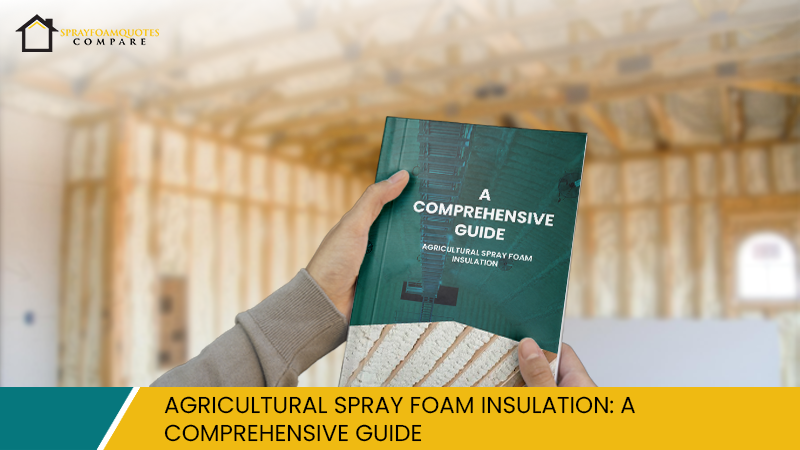A. Definition of Agricultural Spray Foam Insulation
Agricultural spray foam insulation is a highly efficient insulation material commonly used in agricultural buildings. It consists of polyurethane foam that expands and hardens upon application, creating an air-tight and moisture-resistant barrier. This type of insulation is known for its durability and high R-value, which measures its thermal resistance.
B. Importance of Insulation in Agricultural Settings
In agricultural settings, proper insulation is crucial for maintaining optimal temperatures in barns, storage facilities, and greenhouses. It plays a significant role in protecting livestock, crops, and equipment from extreme weather conditions, thus ensuring productivity and reducing energy costs.
C. Overview of the Benefits of Spray Foam Insulation in Agriculture
Spray foam insulation offers numerous benefits in agriculture, including enhanced thermal insulation, moisture control, and improved air quality. It can adapt to various building structures and shapes, ensuring complete coverage and effective insulation.
Types of Agricultural Spray Foam Insulation
A. Closed-Cell Foam Insulation
- Characteristics and Properties
Closed-cell foam insulation is dense and rigid, with a high R-value per inch. It is impermeable to water, making it ideal for areas prone to moisture.
- Applications in Agricultural Structures
Common applications include insulating exterior walls, roofs, and foundations of barns and storage facilities to prevent heat loss and moisture ingress.
B. Open-Cell Foam Insulation
- Characteristics and Properties
Open-cell foam is lighter and more flexible than closed-cell foam. It offers excellent soundproofing properties and is permeable to moisture, allowing buildings to breathe.
- Use Cases in Agricultural Environments
This type is often used in interior walls and attics of agricultural buildings for improved air quality and temperature regulation.
Advantages of Agricultural Spray Foam Insulation
A. Thermal Insulation
- Maintaining Temperature in Barns and Storage Facilities
Spray foam insulation helps maintain consistent temperatures in agricultural buildings, crucial for livestock comfort and crop storage.
- Improving Livestock Comfort
Proper insulation ensures a stable environment for livestock, promoting better health and productivity.
B. Moisture Control
- Preventing Condensation in Agricultural Buildings
It prevents condensation, thereby reducing the risk of mold and structural damage in agricultural buildings.
- Protecting Stored Crops and Equipment
By controlling moisture, spray foam insulation helps protect stored crops and equipment from humidity-related damage.
C. Energy Efficiency
- Reducing Heating and Cooling Costs
Effective insulation reduces the need for extensive heating and cooling, leading to significant energy cost savings.
- Sustainable Practices in Agriculture
Implementing spray foam insulation contributes to sustainable farming practices by reducing energy consumption and carbon footprint.
Application Techniques and Considerations
A. Professional Application Processes
- Hiring a Certified Insulation Contractor
For optimal results, it’s crucial to hire a certified contractor experienced in agricultural spray foam insulation.
- On-Site Assessment and Customization
A professional assessment ensures that the insulation is tailored to the specific needs of each agricultural facility.
B. Equipment and Safety Measures
- Spraying Equipment Overview
Understanding the types of spraying equipment and their proper use is essential for effective application.
- Safety Precautions for Agricultural Spray Foam Insulation
Safety precautions, such as proper ventilation and protective gear, are necessary during application to ensure the safety of workers and animals.
Challenges and Solutions
A. Potential Issues in Agricultural Spray Foam Insulation
- Compatibility with Existing Structures
Assessing the compatibility of spray foam with existing structures is vital to avoid any adverse effects.
- Environmental Considerations
Understanding the environmental impact of spray foam insulation is important for sustainable agricultural practices.
B. Solutions and Best Practices
- Adapting to Specific Agricultural Needs
Tailoring insulation solutions to meet the unique needs of each agricultural setting is key to effective insulation.
- Long-Term Maintenance and Upkeep
Regular maintenance ensures the longevity and efficiency of the insulation.
Conclusion
- Recapping the key benefits of agricultural spray foam insulation highlights its role in enhancing agricultural efficiency and sustainability.
- Promoting the use of sustainable materials like spray foam insulation is crucial for the future of agriculture.
- The Role of Spray Foam Insulation in Agricultural AdvancementsAs agricultural technologies evolve, spray foam insulation continues to play a vital role in advancing sustainable and efficient farming practices.


